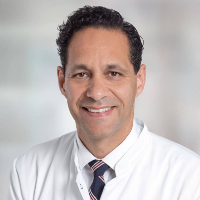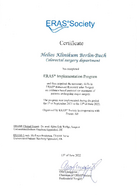Liver Cancer — Extensive Liver Resection: treatment in the Best Hospitals in the World
Treatment prices are regulated by national law of the corresponding countries, but can also include additional hospital coefficients. In order to receive the individual cost calculation, please send us the request and medical records.

Department of General, Abdominal Surgery and Surgical Oncology
The Department of General, Abdominal Surgery and Surgical Oncology offers the full range of services in these medical fields. Whenever possible, operations are performed using minimally invasive techniques, which are the gold standard of modern surgery. The outstanding quality of medical care is confirmed by numerous prestigious certificates, including certificates from the German Cancer Society, the German Hernia Society, etc. In addition, the department provides innovative hyperthermic intraperitoneal chemotherapy (HIPEC), which is available only in the most progressive clinics in Europe.







Department of General and Abdominal Surgery, Colorectal Surgery, Hepatopancreatobiliary Surgery, Hernia Surgery and Bariatric Surgery
The Department of General and Abdominal Surgery, Colorectal Surgery, Hepatopancreatobiliary Surgery, Hernia Surgery and Bariatric Surgery provides the full range of surgical treatment in its field of competence. The department's highly qualified surgeons annually perform about 2,000 surgical interventions. Extensive clinical experience allows the specialists to perform even particularly complex operations. The department’s advanced operating rooms serve for surgery to treat gastrointestinal diseases, liver, gallbladder, bile duct, pancreatic, rectal, anal and colon pathologies. The medical facility also successfully performs operations to treat hernias: inguinal, umbilical, and anterior abdominal wall hernias. In addition, the department's doctors deal with the surgical treatment of morbid obesity. Minor traumatic laparoscopic interventions are considered the gold standard, which guarantee a patient minimal risks and rapid postoperative restoration. Surgeons tell the patient in detail about their upcoming treatment and, in every possible way, support them in their recovery.







Department of General and Abdominal Surgery, Colorectal Surgery, Endocrine Surgery and Hernia Surgery
The Department of General and Abdominal Surgery, Colorectal Surgery, Endocrine Surgery and Hernia Surgery offers the full range of modern surgical interventions in the areas of its specialization. Every year, the medical facility performs more than 2,500 surgical interventions on an inpatient and outpatient basis. The department has vast clinical experience in the field of minimally invasive surgery, which allows the patient to avoid severe pain and prolonged hospitalization. In addition, the department offers robotic surgery using the most modern models of the da Vinci surgical system. The medical facility has the status of the Reference Center for Minimally Invasive Surgery and Hernia Surgery. Surgical treatment of cancer is one of the department's clinical priority focuses. A large number of da Vinci robot-assisted interventions are performed here for gastrointestinal cancers. The department holds a leading position in the use of the da Vinci surgical system in the treatment of rectal and sigmoid cancer patients. The operating rooms of the medical facility are equipped with the very latest technology, while hygiene and safety standards are at the highest level as well. Prior to surgery, the patient undergoes a comprehensive examination. Doctors also assess the risks of the upcoming operation and its expected results. With appropriate clinical indications, preference is always given to minimally invasive surgery.






Malignant liver tumors are very dangerous. In most cases, they are detected at an advanced stage and are not subject to radical treatment. However, if the doctor decides during the examination that the disease can be treated surgically, the patient's chances of recovery may be quite high. Although the overall five-year survival rate for liver cancer patients is only 18%, in some clinics it can be as high as 70-80% for patients who have undergone an extensive resection.
Content
- When can surgery be performed?
- Before surgery
- The essence of the operation
- Treatment abroad with Booking Health
When can surgery be performed?
Surgery for liver tumor removal can be performed under the following conditions:
- Localized cancer without metastases and some cases of locally advanced cancer.
- Sufficient liver reserve to maintain organ function after surgery.
- Absence of severe somatic diseases and other contraindications to the removal of part of the liver.
- A single tumor rather than multiple neoplasms.
- No invasion of major blood vessels.
Surgery cannot be performed if the risk of severe complications or intraoperative mortality is very high, or if the doctor believes that removing part of the liver will not cure the patient. The aim of resection is to completely eliminate the disease. If this cannot be achieved in this way, other surgical treatments can be used. Doctors can use ablation or embolization to shrink the size of the tumor. Organ transplantation may also be used for radical cancer treatment.
Before surgery
Before surgery, the surgeon must thoroughly examine the tumor, its blood supply, and the function and structure of the liver. For this purpose, instrumental studies such as a CT scan or an MRI scan are performed, necessarily with angiography. The procedure involves contrasting the blood vessels that supply blood to the tumor and various parts of the liver.
During the diagnosis, the surgeon can plan the operation. In some cases, the surgeon comes to the conclusion that it is not advisable to remove part of the liver. For example, if the tumor is found to have grown into a large blood vessel. In this case, it is very likely that the neoplasm will recur after tumor removal, so such a dangerous and complicated operation does not make any sense.
Most patients do not undergo liver resection. This is due to the fact that cancer is usually caused by cirrhosis. And a surgical intervention for this disease ultimately leads to liver failure.
Cirrhosis can be treated with surgery. However, it can only be performed if at least 30% of the functioning liver volume is preserved as a result of the surgical treatment. To make a prognosis, the doctor assesses liver function before surgery using the Child-Pugh score. It is based on the assessment of the bilirubin and albumin levels and prothrombin time (reflects blood clotting) and takes into account the presence of ascites (fluid in the abdominal cavity) and hepatic encephalopathy (brain damage). This results in classifications A, B, or C. The category A is operated on, and the category C is not. Patients with category B can sometimes be candidates for surgery if the doctor assesses the likelihood of a successful surgical outcome as high.
The essence of the operation
Liver resection for metastases (locally advanced cancer) is always extensive. Not only several segments of the liver are removed, but also nearby organs. These may be large blood vessels, kidney, adrenal gland, or a fragment of the pancreas.
Extensive liver resection is a dangerous operation. In different clinics around the world, the mortality rate of this surgery varies from 6 to 36%. The variation is quite significant, which is due to both the peculiarities of the patient selection process and the quality of medical care. It is better to undergo surgery in the world's best clinics to have the highest chances of a successful treatment outcome.
The results of treatment also differ significantly. After extensive liver resection, different clinics achieve three-year patient survival rates of 19-86% and five-year patient survival rates of 10-84%.
Laparoscopic liver resection for malignant tumors is rarely used. It can only be performed in specialized centers and has many limitations. When laparoscopic liver resection is nevertheless performed, the results are comparable to those of open surgery, and the risk of complications is lower.
Prof. K.J. Oldhafer: The Future of Liver Surgery and Cancer Treatment
Treatment abroad with Booking Health
You are welcome to undergo your liver cancer treatment abroad. Why not take advantage of the services of Booking Health for this purpose? We will organize your treatment at the world's best clinics. Our benefits are as follows:
- Selection of a specialized oncology clinic with good statistics on the results of liver cancer treatment.
- Reduced cost of liver resection due to the absence of surcharges and coefficients for international patients.
- Appointments with doctors for your preferred dates.
- Preparation of the treatment program, taking into account the results of your previous diagnostic tests.
- Direct communication with your surgeon.
- Keeping track of all stages of the medical care program.
- Control of the costs of procedures and treatments and refund of unspent funds after liver resection.
- Buying and forwarding medications to your native country.
- Arrangement of additional diagnostic or treatment procedures.
- Communication with the clinic after liver resection.
Booking Health is the perfect company to provide you with high-level services. Our staff will be pleased to assist you with your accommodation and flight arrangements, as well as meet you at the airport and provide transportation to the clinic.
Authors:
The article was edited by medical experts, board certified doctors Dr. Nadezhda Ivanisova and Dr. Vadim Zhiliuk. For the treatment of the conditions referred to in the article, you must consult a doctor; the information in the article is not intended for self-medication!
Our editorial policy, which details our commitment to accuracy and transparency, is available here. Click this link to review our policies.
Sources:

